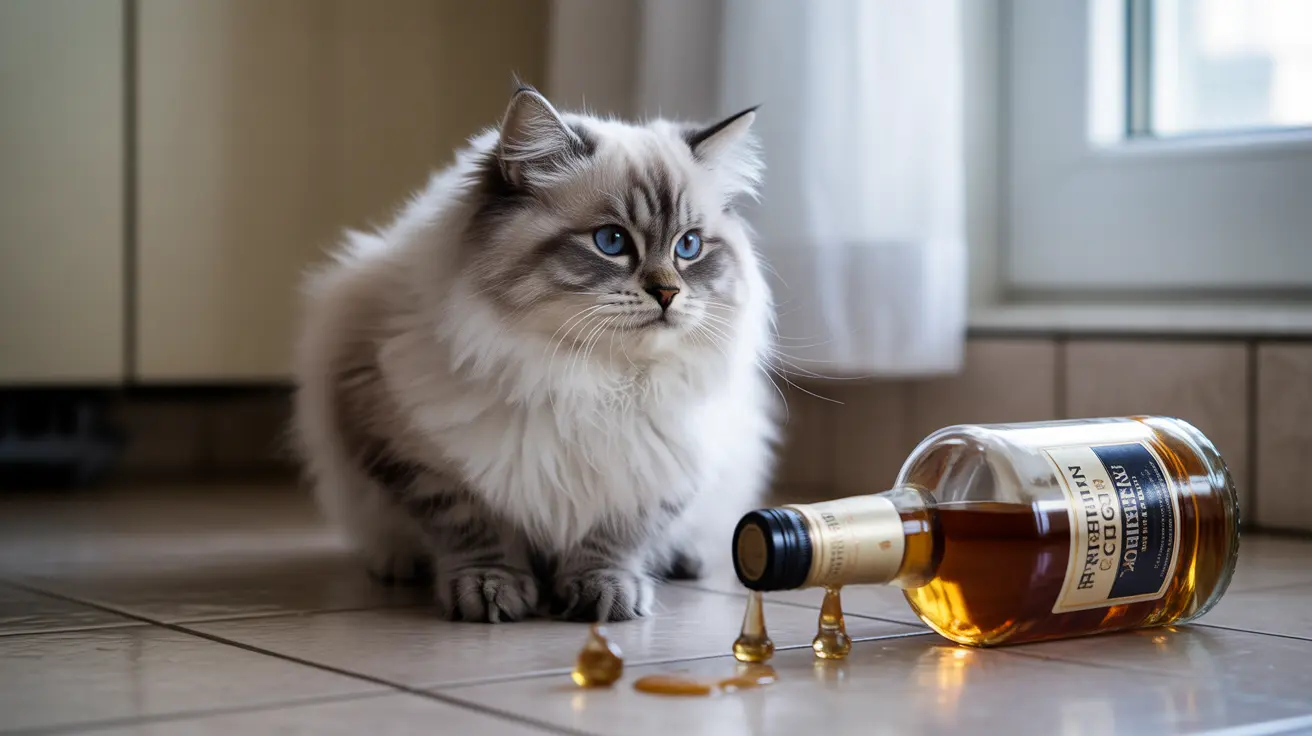Cats possess an extraordinary sense of smell that far surpasses human capabilities. With approximately 200 million scent receptors in their noses - about 14 times more than humans - cats have an incredible ability to detect various substances, including alcohol. This remarkable olfactory power makes them particularly sensitive to alcohol and its potentially harmful effects.
Understanding how cats perceive and react to alcohol is crucial for pet owners, as it helps ensure their safety and well-being. Let's explore the fascinating relationship between cats and alcohol, including their natural aversion to it and the important safety considerations every cat owner should know.
How Cats' Sense of Smell Works
A cat's nose is a sophisticated organ that plays a vital role in their daily life. Their enhanced olfactory system allows them to detect substances at concentrations far lower than what humans can perceive. This heightened sensitivity explains why cats often have strong reactions to various scents, particularly alcohol.
When it comes to alcohol, cats can detect not only alcoholic beverages but also products containing alcohol like perfumes, cleaning supplies, and hand sanitizers. Their acute sense of smell serves as a natural warning system, helping them avoid potentially dangerous substances.
Why Cats React Strongly to Alcohol
Most cats display an immediate aversion to the smell of alcohol. This natural response is actually a protective mechanism, as alcohol can be extremely dangerous for felines. When cats encounter alcohol, they may exhibit various behaviors such as:
- Turning their head away
- Fleeing the area
- Showing signs of distress
- Avoiding spaces where alcohol is present
The Dangers of Alcohol Exposure for Cats
Cats' sensitivity to alcohol goes beyond mere dislike - it presents serious health risks. Their small body size and unique metabolism make them particularly vulnerable to alcohol toxicity. Even minimal exposure through ingestion, inhalation, or skin contact can lead to severe complications.
Common sources of alcohol exposure include:
- Alcoholic beverages
- Cleaning products
- Hand sanitizers
- Perfumes and colognes
- Mouthwash
- Rising bread dough
Protecting Your Cat from Alcohol Exposure
As responsible pet owners, it's essential to take precautions to protect cats from alcohol exposure. This includes proper storage of alcohol-containing products and maintaining awareness during social gatherings where alcohol might be present.
Key safety measures include:
- Storing alcoholic beverages in secure cabinets
- Keeping cleaning supplies out of reach
- Cleaning up spills immediately
- Ensuring proper ventilation when using alcohol-based products
- Supervising pets during parties or gatherings
Frequently Asked Questions
Can cats detect the smell of alcohol, and why do they dislike it so much?
Yes, cats can readily detect alcohol due to their powerful sense of smell (200 million scent receptors). They naturally dislike alcohol's strong scent because it's overwhelming to their sensitive olfactory system and their bodies recognize it as a potentially harmful substance.
What are the symptoms of alcohol poisoning in cats, and how quickly do they appear?
Symptoms typically appear within 20-90 minutes and include lethargy, drooling, vomiting, loss of coordination, and weakness. More severe cases may present with disorientation, collapse, slowed breathing, and potentially life-threatening complications.
How dangerous is alcohol exposure for cats, and what household items should I keep away from my pet?
Alcohol exposure is extremely dangerous for cats, even in small amounts. Keep all alcoholic beverages, cleaning products, hand sanitizers, perfumes, mouthwash, and rising bread dough safely away from your cat's reach.
What should I do if I suspect my cat has ingested or come into contact with alcohol?
Contact your veterinarian or animal poison control immediately. Do not wait for symptoms to appear, as quick intervention is crucial for successful treatment.
How do vets treat alcohol poisoning in cats, and what is the typical recovery process?
Treatment typically involves supportive care, including IV fluids, monitoring of vital signs, and management of symptoms. With prompt veterinary attention, most cats recover well, though the process may take several days depending on exposure severity.
Remember, prevention is always better than treatment when it comes to protecting your cat from alcohol exposure. By understanding your cat's sensitive nose and maintaining a safe environment, you can help ensure your feline friend stays healthy and happy.






